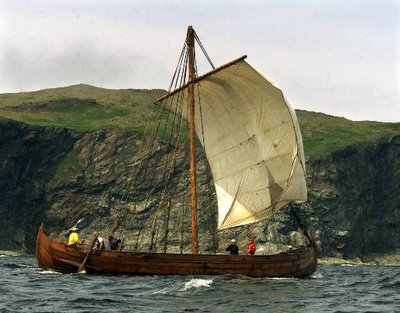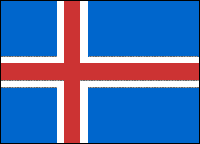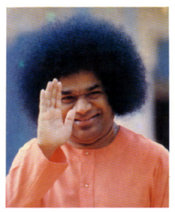
On Chieftans, Thingmen, Feastings and Sagas: Viking Age Iceland (Part Two) Viking Age Iceland (Jesse Byock)
Byock quickly informs on the hot topic here, early Icelandic cultural development highlights its uniqueness among its warmer, European mainland cousins, aside from the severity of environmental conditions. Its Scandanavian settlers, replete with polar constitutions were not unaccustomed to the brusqueness of brutal winters, thus these easily carved warm nests into their miens, although out of a scantily provisioned homeland. Mother Hubbard's cupboard probably could not compare to what these settlers found to embrace as pioneers on a true semi-frozen island in the stream. What seems to startle at first makes sense upon deliberation.

These hardy Vikings were highly deliberate, and fair-minded peoples, with well thought out, well organized, simplified people management methods for conducting themselves collectively and equitably. For supposed fierce barbarians, which they were perceived to be by their prey-like cousins, or simply as successful warriors, which they were, in an age of several fearsome war-like European clans, no less should be expected of the efficient Viking. Those hordes of populous, rich, fattened, easy coastal opportunties which arose on many occasions beneath their monstrous fores were doubtlessly impossible to resist as quick and easy pickings, as easy and as quick as several major Icelandic business takeovers on the mainland of late.

Now instead of running from fire breathing dragons Europeans are merged and acquiesced upon the snappings of Landsbanki and its affiliated parties, the gobblings and feastings of Kaupthing Bunardarbanki, the ravenousness of Baugur, the antics and dealings of Bjorgolfur Thor Bjorgolfsson, the rapacious joustings of Bakkavor, the flanking of the winged valkyrie which was once the drone of Icelandair, dazed Europeans left gawking at the infamous goings on concerning Bjorgolfur Gudmundsson and the Hafskip Fiasco. These Vikings prove in their descendants that their boiling bloods are alive and well on the financial fronts. These peerless navigators of winds, sun, and stars were comfortably at home when at home, among their own fully liberal in government, mightily staid and placid, and their medieval social framework was as strong, clearly as stolid as their literary records appear to be, embodied in lengthly, numerous, even at times monotonous, family sagas.
It all began with a man named Mord in Njal's Saga. He was also called Fiddle. He is Iceland's first and foremost: Chieftain. And he was considered great not because he was a warrior, but because he was...a lawyer. This creature reviled in all other great civilisations, yet boosted to the top rung of a rigid cultural ladder among the Vikings. James Bryce is quoted by Byock that Iceland, "...produced a Constitution unlike any other whereof records remain, and a body of law so elaborate and complex that it is hard to believe that it existed among men whose chief occupation was to kill one another." At least it proved regulated, which cannot be said for much global financial fracas in the current incendiary business age.

The chieftain or godi was purely a political leader, as there were no organized police forces for almost the first five hundred years of settlement, his authority was limited, but something most Maritimers feel perhaps familiar with, as one prefers the police only when one requires them, thus among moral village-based societies there is little need. Farmers and their herds had no clear limitations or privileges to limited resources, indicative of fair-minded sharing, and during disputes, resolutions of these freeholders, called bondr were organized according to the chiefs representatives into councils called thingmen. These thingmen were arranged and shared interests in maintaining peaceable relations and one's good graces constitued the quality of being "in thing" with the godi. Any minion office worker can relate to the benefit of being "in thing" with the boss, many accomplish it through prodigious ass-kissing or more concerning godis like Sai Baba for example. Similarly there appears no terminology for "out thing". It seems fairly obvious there was logically only ever one position available in terms of thingmen. The godi role in Icelandic society was descendant from old Norse concepts of priestly, god-like leadership (Hence an Indian self-appointed godi as an example). Imagine a Thor-like character perhaps embodied with probable god-like reverance. Fawning obedience. The Vikings were agreeable, I can imagine them smiling much together and working things out to keep everyone "in thing" rather than snarling or dying over petty disagreements. Definitely these early residents of Iceland knew any concept of "out thing" would be a bad thing.

No comments:
Post a Comment